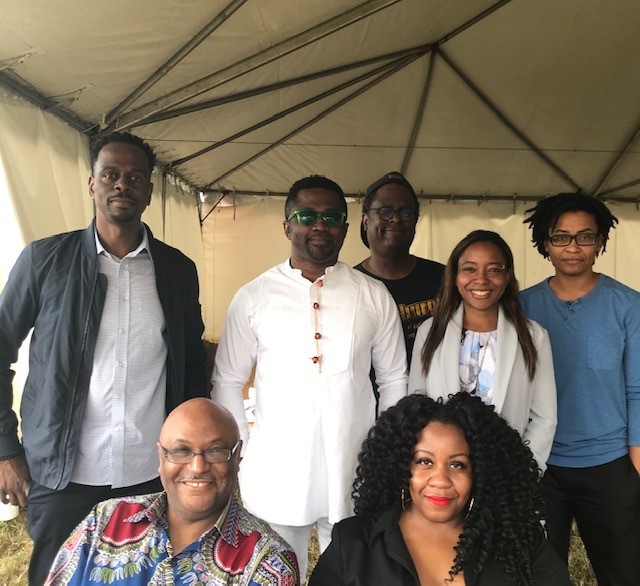2020-2021 Afrofuturism Syllabus - Week 10 - P. Djèlí Clark on Retrofuturism
Image: Participants in the Afrofuturism Writers' Pavilion at the 2020 Zora Neale Hurston Festival of the Arts and Humanities. Mr. Clark is in the back row, far left. Front row, left to right: Maurice Broaddus, Dr. Chesya Burke. Back row, left to right: P. Djèlí Clark, Dr. Iheoma Nwachukwu, Bill Campbell, Dr. Michele Tracey Berger, Tenea D. Johnson. Image Credit: Dr. Michele Tracey Berger.
Welcome to Week 10 of the ZORA! Festival 2020-2021 Afrofuturism Course!
Please begin by reviewing About the Course for an introduction and orientation to the 2020-2021 Afrofuturism Syllabus, which bridges the organizing themes of the first two years of the five-year Afrofuturism Conference Cycle: "What is Afrofuturism?" and "What is the Sound of Afrofuturism?"
Note: Each week the course coordinator will release new content related to the conference themes. Content posted here will remain publicly accessible and may be incorporated into other courses, in part or in full, via links to this site. Suggested citation: French, Scot. Syllabus for ZORA! Festival Afrofuturism Course, University of Central Florida, Orlando, Fall 2020-Spring 2021. STARS, https://stars.library.ucf.edu/afrofuturism_syllabus_about/.
Conversations
In the Conversations segment we share resources featuring participants in the 2020-2021 ZORA! Festival Afrofuturism Conference.
This week’s featured Conversation is a podcast interview with writer P. Djèlí Clark, a participant in the Afrofuturism Writers’ Pavilion at the 2020 ZORA! Festival.
Mr. Clark is a writer of speculative fiction, including The Black God's Drums (2018) and The Haunting of Tram Car 015 (2019). In this conversation, he recounts the complex journey that defines his black speculative practice.
This interview was conducted by Grace Chun, project coordinator at the University of Florida Samuel Proctor Oral History Program, during the ZORA! Festival Afrofuturism Conference on Jan. 30, 2020. It lasts about 20 minutes.
You can find the interview here.

Explorations
In the Explorations segment we pose a series of questions for further investigation and class discussion, based on the featured Conversation. As you listen to the podcast interview, consider the following questions:
- Though he was born in Queens, N.Y., Mr. Clark spent his formative years in the West Indies. How did his experience there, particularly in the cultural environment of Trinidad, shape his writing?
- Mr. Clark uses the term "retrofuturism," or "retro-Afrofuturism" to describe his work. What does he mean by that term?
- What role does Mr. Clark see for Afrofuturism in this moment? What can society learn from writers of black speculative fiction?
- Mr. Clark was not introduced to the critically acclaimed works of Afrofuturist writers Octavia Butler and Samuel R. Delany until college. Today, he says, they are more easily discovered through social media. Which writers/artists/performers, past or present, would he recommend to someone new to Afrofuturism?
References
Authors, artists, and works referenced in the podcast include:
- The Twilight Zone (TV show)
- Star Trek (TV show)
- Steampunk
- Madeleine L'Engle's A Wrinkle in Time (1962)
- J.R.R. Tolkien
- Forgotten Realms (Dungeons & Dragons fantasy role-playing game)
- Margaret Weis and Tracy Hickman's The Dragonlance Chronicles (1984-85)
- Frank Herbert's Dune (1965)
- Ray Bradbury's The Martian Chronicles (1950), The Illustrated Man (1951)
- Octavia Butler
- Samuel R. Delany
- Nisi Shawl's Everfair (2016)
- Janelle Monáe
- George Clinton and the P-Funk Mothership
- Sun Ra
- Zora Neale Hurston
- Langston Hughes
- Fire!
- Sankofa
- Pauline Hopkins
- Cadwell Turnbull
- Sheree Renee Thomas's Dark Matter: A Century of Speculative Fiction from the African Diaspora
- W.E.B. DuBois
- George Schuyler
Up next: An interview with Tenea D. Johnson, a speculative fiction author, poet, and musician. She is the author of several books, including Smoketown: A Novel (2011), as well as Starting Friction (2008), a collection of poetry and prose.

